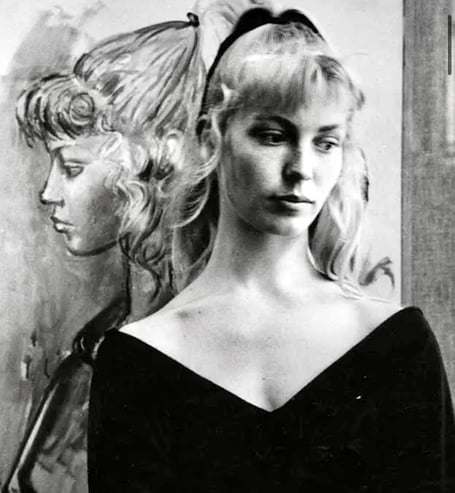Sylvette David, also known as Lydia Corbett, was once the muse and model of the greatest painter of the modern age, Pablo Picasso. She appeared in dozens of his artworks as the beautiful, young girl with the blonde ponytail. An artist in her own right, she spoke to Richard Torne about her time with the troubled artist and how art and Buddhism helped her to overcome a sinister episode during childhood.
Is it Lydia or Sylvette? I ask.
Even now, 70 or so years after she first met Pablo Picasso in the coastal town of Vallauris, in the south east of France, it’s not very clear.
The frail 88-year-old lady who greets me at her Devon home is somewhat ambiguous about it all, as though she’s happy to add to the mystique surrounding the name that made her a legend in the art world all those decades ago.
“Sylvette David is my maiden name. My married name is Corbett...and Lydia is from a spiritual wise man I met in the ‘60s,” she explains in a delicate French accent.
Whichever name she prefers, it’s ‘Sylvette’ who is etched on everyone’s mind. She is the golden-haired, 19-year-old muse who inspired Picasso during the mid 1950s, when the Spanish painter was in his 70s.
He went on to feature her in more than 73 of his paintings and artworks, most notably ‘The Girl With The Pony Tail’. But while it may have been just another episode in the life of the greatest painter of the modern age, it was nothing short of an earthquake in the life of a shy, young woman.
“He inspired me all my life,” Sylvette says smiling, sitting under a small print of Picasso’s ‘Guernica’. “I learned to be free. When I sat with Picasso I was in another world.”

The walls of her house are covered with paintings, mostly her own and, unsurprisingly, a few Picasso prints, although disappointingly there are no original works. Picasso once gifted her a portrait of hers, but she no longer has it.
Born in Paris to an English mother and a French father, Sylvette spent the war years in the Gallic country as a child. It was predictably not a happy time for her, but Germany’s invasion wasn’t the most traumatic episode because at the age of eight she was abused by her mother’s boyfriend.
“I never forgot, and of course it made me worried about men - I was terrified of people when I was young.”
She later attended the famous Summer Hill school in Suffolk, where she was told that she could do whatever she liked. It turned out to be quite a good form of therapy as it helped to free her mind and ease her emotional pain.
Sylvette’s harrowing experience however provides a new perspective on the old black and white photos we have of her together with Picasso. In them, she often appears unsmiling, subdued even, as though her own beauty meant little to her.
She later turned to religion after a dream she had many years ago in which three German soldiers attack her with bayonets. At the last moment they transform into crosses, which she interprets as hate turning into love and forgiveness.
Indeed, there is no apparent trace of bitterness or resentment in her, and brings to mind a comment she once made in another interview: “I’m ever so grateful about everything that happened in my life – the bad and the good – because it made me who I am now.”
Perhaps the passage of time has blurred the line between reality and fiction. As Picasso once said – everything we can imagine is real. And if art is just another form of therapy, what does painting mean to her? “It’s about forgetting the pain of everything; it’s like going into yourself, there’s no fear, only peace.”
Like her former mentor, Sylvette works in different mediums, including clay and ceramics, but painting in acrylic and oil (especially with a palette knife) is still her preferred medium. “I love charcoal too, because it’s full of feeling,” she adds.
Inevitably, the ghost of Picasso dominates the conversation. His highly controversial views on women are well documented. Widely regarded as a misogynist, he reputedly once said “women are either goddesses or doormats” and his tempestuous affairs often left a trail of grief and tragedy.
Four or his muses died in tragic circumstances; two had mental breakdowns and two committed suicide, but Sylvette is highly sceptical about the way the painter’s life has been depicted and mostly rejects the accusations made against him.
“I never believed all that - they (the women) had problems, jealousies...I don’t know,” she trails off.
While she thought nothing of once posing topless for him, insisting that’s as far as it went, on another occasion when he led her into his bedroom, she stood cautiously at the door, refusing to enter. “He wanted me to sit on the bed and play like a child, but I didn’t.”
Another time, they both sat chatting innocently inside his car, a beautiful Hispano Suiza that was being kept in storage in his barn. “He talked about his past, the people he loved, the war and The Old Guitarist (one of his most famous paintings, depicting a frail figure – perhaps mirroring his own fears about death?). Nothing happened there, he didn’t touch me at all.”
Amusingly, she admits she did not understand every word he said – “he had a strong Spanish accent,” she laughs.
The suggestion that Picasso might have been a paternal figure of sorts sits well with her - “like his spiritual wife,” she adds grandly. “He is still here with me in my work. He is very close to me.”
Despite suggestions that he fell in love with her, she says they were never in a relationship, but such is the undying fascination with the artist and the inextricable link between them that Sylvette is the subject of a new book about her career and her time with Picasso.
Written by art critic Lucien Berman, ‘Sylvette David/Lydia Corbett, Ceramics, Painter and Sculptor in Clay’, the book explores her career and Picasso’s pervading influence over her.
As Berman points out, Sylvette is the only woman along with Françoise Gilot who survived as artists in their own right “the intense regard, the fierce genius and passion that was Pablo Picasso”.
Sylvette David/Lydia Corbett and Lucien Berman will be attending the book launch at Dartington’s Great Hall on September 15 at 7.30pm.





Comments
This article has no comments yet. Be the first to leave a comment.